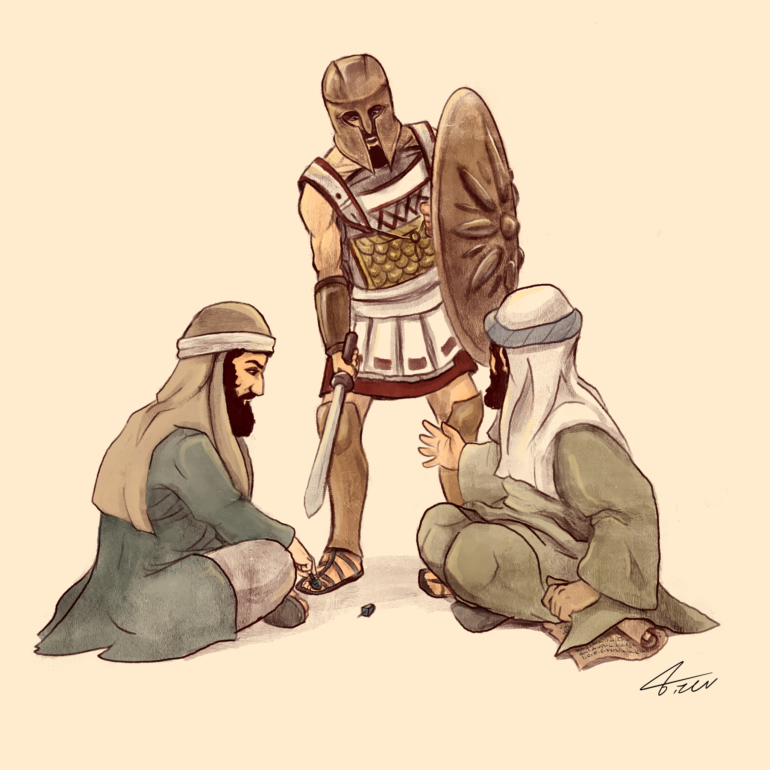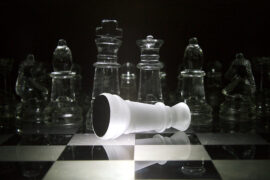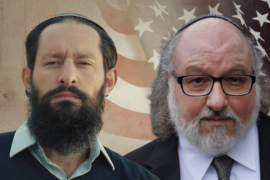The third chapter of a podcast series on the first Book of Maccabees.
For more content from VISION Magazine, subscribe to our newsletter and follow us on Twitter @VISION_Mag_, Facebook and YouTube. If you haven’t already, don’t forget to subscribe to our podcast on SoundCloud, iTunes, Stitcher, TuneIn, or Spotify and leave a rating and review to help us get our message out to a wider audience!
To support the podcast, head over to our PayPal portal and be sure to write a note that your contribution is for the podcast.
Hosted by: Robert Goodman
Transcript:
Shalom Aleikhem! And welcome back to Sefer Maccabim!
We saw last time how the revolt begins when Matityahu ben Yoḥanan refuses to obey the Greek officials when they came to his hometown of Modiin. How he triggers the Jewish uprising against the Greeks and flees with his sons into the hills, how God-fearing Jews flock to him and swell the ranks of the army. And Matityahu’s last instructions to his sons before he is niftar at a hoary old age.
Now the very first verse of chapter three reads:
״ויקם יהודה המכבי תחת מתתיהו אביו״
“And Yehuda HaMaccabi rose up in place of Matityahu his father.”
As instructed by his father on his deathbed, Yehuda assumes his role as captain of the Jewish forces. All the Jews who followed Matityahu unanimously accept Yehuda as their new leader, and led by him they set out with vigor to fight the battles of their people.
Now this seems as good a time as any to go off on a slight tangent and spend a little time discussing the actual battle tactics of the Maccabees.
First of all, how did the Greeks fight? They are famous for fighting in a phalanx – in units of sixteen by sixteen soldiers protecting themselves with a wall of locked shields, pointing a lethal wall of pikes (long spears) straight ahead to create a truly formidable weapon.
The heavily armored phalanx was the weapon that allowed Alexander the Great to be victorious in his battles against the Persians as he went forth to conquer the world. But for the phalanx to work, you need space to make it work. You need enough space for sixteen soldiers to walk side by side with shields locked and spears leveled. In a place like Egypt this wouldn’t be a problem, because the only inhabitable places in Egypt are those watered by the river Nile, and to be accessible to the Nile’s rising floodwaters these farmlands had to be relatively flat. In a flat country like Egypt you have plenty of space for a phalanx to fight.
But Eretz Yisrael is not like Egypt. Granted, you do have the relatively flat Sharon plain along the coast, but for the most part Eretz Yisrael is best described by the pasuk in Parshat Ekev:
״ארץ הרים ובקעות למטר השמים תשתה מים״
“A land of mountains and valleys, which soaks up its water from the rains of heaven.” (D’varim 11:11)
Anyone who has been to Judea and Samaria can testify just how many hills and valleys there are, and quite frankly I would say it’s the opposite of flat. The hills are rocky and steep sided, and the valleys are extremely narrow. There’s a reason why the Maccabees set up their base camp in the hills there – can you imagine a Greek phalanx trying to stagger through the twisty maze of valleys between the hills carrying eighty pounds of armor and weapons, trying both to keep their balance and maintain the phalanx by keeping their shields locked and spears leveled? It can’t be done.
And what happens when your Greek forces are picking their way through the valley and suddenly a band of vicious Jews comes at you from above, armed with bows and slingshots, raining arrows and hurling stones down upon you?
And what do you do when you just about panicked enough to turn round and the band of Jews storm down into the valley and hurl themselves at your soldiers, killing dozens of them, then dispersing back up the mountain slope like goats, disappearing in ten different direction behind rocks and trees so that even if you could mobilize your forces to launch an attack, you wouldn’t know which way to turn?
And what happens when the Jews launch attacks like these over and over and over again until you have no choice but to flee for your life back the way you had come, with hundreds of dead mercenaries carpeting the valley behind you and an arrow stuck in your toga?
This was the tactic of the Maccabees. The Greeks had boundless weapons, armor, a near endless supply of mercenaries, and also war elephants, which we’ll speak more about later. We, the Jews, had the land and a people with a burning desire for freedom. In this war the land itself became our strength and our weapon – we would lead the Greek soldiers after us into the narrow valleys, then ambush them from above with our signature weapons – the slingshot, which David famously used to bring down the giant Goliat, and the bow, which we used to fill the skies with iron-tipped cedar arrows which we would rain down on the Greeks. The Greeks became so afraid of this wave of arrows falling from the sky that they even came up with a name for it – “Judean rain.”
If they tried to follow up the mountainside, we would disperse and disappear in ten directions making it impossible for them to follow us. And anyway, can you imagine a Greek chasing a nimble Jew up a steep mountain slope in fifty pounds of armor? He might make it ten feet before being either running out of breath of being caught by a stone or an arrow. In our war against the Greeks, Eretz Yisrael became our fortress and our weapon, she served us well, and we served her.
It took a long time, but eventually this tactic wore the Greeks down so much that they left Judea for good. This shouldn’t come as a surprise – I learned from Rabbi Yehuda HaKohen a piece of revolutionary theory that in a war of liberation, if you make the price of occupation higher than the benefits of exploitation, the occupier will leave. What this means is that while the Greeks were able to remain in Judea taking all our crops and other goods while meeting little or no resistance, they weren’t very likely to leave. But once there arose an army of Jews dedicated to fighting the Greeks who began carpeting the valleys of Judea with Greek dead, it wasn’t worth their while to stay anymore. So they left.
This anti-colonial tactic would be later repeated by many a revolutionary movement, including the Jewish underground fighters in the 1940s who, following in the footsteps of the Maccabees, fought to free Eretz Yisrael – this time from British rule.
Now let’s return to the text. Yehuda HaMaccabi leads the Jewish army across the length and breadth of Judea, wiping out all traces of idolatry he comes across, destroying the wicked men from the midst of Israel. The text describes Yehuda as ״אריה שואג לטרף״ – “a lion roaring for his prey,” a term David often uses in Tehillim.
Yehuda’s reputation spreads – the Greeks and Hellenist Jews begin cowering in fear of this legendary Jewish warrior who brings salvation wherever he goes. As Yehuda’s fame grows, so does his army; Jews with nothing left to lose are flocking to join his army, completely ready to lay down their lives to ensure the freedom of Eretz Yisrael and their people. By now the whole world knows the name of Yehuda HaMaccabi, so it’s hardly surprising that Apollonius, the Greek general appointed by Antiochus as warden of Judea, becomes aware of the band of Jewish rebels amassing in the mountains to revolt. Naturally, it’s his job to put a stop to this sort of thing, so Apollonius gathers 2,000 Greek and foreign mercenaries and moves south from the city of Shomron intending to put a firm end to this ridiculous band of petty Jewish fighters, by slaughtering them all and arriving back at camp in time for dinner.
But when news of this approaching Greek army reaches Yehuda, he doesn’t wait for them to reach him – he takes 600 of his men and sets out to meet them. Using their tactics of coming at the Greeks from above, the Maccabees fight their first major battle, raining stones and arrows on the Greeks, then storming down into the valley to massacre the panicked mercenaries and escaping back up the hills like goats.
The Maccabees are victorious and slay many of the mercenaries. Yehuda kills Apollonius with his own bare hands, and the rest of the mercenaries turn and flee. Yehuda gathers up the spoils left behind to take back to their camp, and for himself he takes the sword of the slain Apollonius, which becomes his personal sword to wield in every battle until his last.
This is a significant fact when we consider the fighting style of the ancient Hebrews. The swords of the ancient Hebrews were not straight like the swords we think of today, which are shaped like the Christian cross to symbolize how one who holds it is fighting for the cross. The ancient Hebrews used curved swords, shaped like sickles. In fact, although all the tribes were obligated to join the national army, we see from the blessings of Yaakov and Moshe in Parshiyot Vayeḥi and V’zot HaBrakha that the tribe of Gad specifically focused on raising the best soldiers and army commanders, and they actually had a unique fighting style – Rashi on D’varim 33:20 tells us how when the soldiers of Gad would kill an enemy soldier, they would cut off their head and right arm in one swipe.
There were only two people we know of in Jewish history who fought with a different style of sword. One was Yehuda HaMaccabi, who as we just saw in our text, took the sword of Apollonius, which was shaped like the straight swords we know today. The other was David, who arrives at the Mishkan in Nov starving and on the run from King Shaul, as we are told in Shmuel I, chapter 21, asks for Aḥimelech the Kohen Gadol to give him bread and the sword of the giant Goliat, who David had killed himself. This sword was also not like the curved swords of the Hebrews, but was also straight. So we see that King David and Yehuda HaMaccabi were the only two ancient Hebrews to fight with a different kind of sword.
Now back to the Book of Maccabees: News of the defeat of Apollonius has reach the ears of Seron, a high ranking officer in the Syrian-Greek army. Seron stands up and proclaims, “I’ll be the one to go and fight Yehuda and his band of rebels, I’ll Hellenize the lot of them or else kill them, and I’ll earn such a good reputation my name will be known throughout the empire.”
Modest, no?
So Seron prepares a mighty host of men and sets off toward Judea to avenge the Greek losses.
The army enters Judea and approaches the ascent of Beit Ḥoron, which is in the Judean hills about halfway between Modiin and Jerusalem. To reach the Maccabean camp located in the Gofna hills, the Greeks were trying to march their armies eastward up into the mountains. But the topography of Eretz Yisrael meant there were only a few places where they could actually ascend; apparently the natural canyon of Beit Ḥoron was one of them.
Meanwhile, Yehuda is approaching from the other direction with a small group of men. When they reach the crest of the ascent and see the massive Greek army spread out beneath them, Yehuda’s men ask him, “How shall we, being so few, be able to fight against so great and strong a multitude, seeing we are ready to faint with fasting all this day?” (Before a battle, the Jewish soldiers would fast and do t’shuva in an effort to make themselves worthy of receiving Divine assistance in battle, because of course it’s HaShem who really fight our battles.)
Yehuda answers them, ״היד ה׳ תקצר לתת רבים ביד מעטים?״ – “Is the hand of HaShem limited that it cannot give the many into the hands of the few?”
And then he adds, “They come against us with their possessions and armies to destroy us along with our wives and children, but we fight for our lives and for our Torah. Victory in battle is not achieved with mighty armies, but through strength from heaven. HaShem will overthrow them before us, do not fear them.”
No sooner has Yehuda finished speaking when he leaps up and hurtles down the mountainside, hurling himself at the heavy armored mercenaries, wielding the sword of Apollonius and stabbing and killing all the mercenaries in his path. Seron and his army are completely overthrown by the sudden appearance of the Maccabi.
Encouraged, Yehuda’s men leap up after him, and they charge down Beit Ḥoron, killing all the mercenaries they can reach. The Greek army has no choice but to turn and flee westward towards the coastal plain, where they take refuge in the walled cities by the coast. But eight hundred mercenaries fall at Beit Ḥoron, and it’s another miraculous victory for the Maccabees.
See what emuna and bitaḥon Yehuda HaMaccabi has in HaShem! Just like King David, despite his miraculous victories Yehuda never becomes conceited or takes credit for himself; rather, he attributes all his successes to HaShem.
Now this is just a personal thought but I believe this giving up all credit to HaShem was a key factor that contributed to the eventual Jewish victory. Why do I say this? Although at the time of the revolt, B’nei Yisrael were divided into factions, as we’ve already mentioned, we, the Jews, won because we remained humble and never forgot the true source of our strength. In contrast, more than 250 years later after the destruction of the second Beit HaMikdash, B’nei Yisrael revolted again to free Judea from the Roman Empire. Rabbi Ken Spiro writes in his book, Crash Course in Jewish History, that at that time all the Jews were completely united around the leader of the revolt, Shimon Bar Koziva, or Bar Kokhba as he became known. There were no factions or splits between Jews. Yet we lost the Bar Kokhba Revolt when the Roman soldiers broke through the walls of the city of Betar and proceeded to massacre the 580,000 Jews taking refuge there, not one of whom surrendered.
Why did we lose? Our sages say because we were too arrogant. We adopted the attitude of “by my strength and the might of my hand I did this.”
So it’s clear just how crucial this humility and deference to HaShem is for any Jewish captain of war.
After this victory at Beit Ḥoron, Yehuda and his men become more famous than ever before, and the nations of the world are terrified of him. Even Antiochus Epiphanes has heard of him by now, and of course he’s livid. He begins to gather all the forces in the Seleucid Empire to mobilize against the Jews, and he even opens his treasury and uses his hard earned wealth to pay his soldiers in advance for a full year of fighting. Then he realizes that he doesn’t have enough money – his decrees of Hellenization on top of other troubles throughout the empire have taken their toll on the royal treasury. So he decides to take half his forces on an expedition into Persia with the aim of raising more money by forcing other countries there under still under Greek rule to pay him tribute.
Antiochus also hopes on this expedition to reconquer the Parthians, who declared independence from Seleucid Greece several decades before. The Parthians were a people living in what’s now western Iran who excelled at archery, and around 200 BCE (or 3560) they fought successfully against their Seleucid rulers, declared independence and established an empire that would go on to last a little over 400 years (I learned this information about the Parthians from a fellow talmid at my yeshiva). Antiochus hopes he will be able to reconquer the newly independent Parthians and thereby force them to pay him tribute. As mentioned before, the Parthians are wicked at archery and not easily overcome, but Antiochus is so desperate he is willing to do anything to earn more money to use to fight the Jews.
Before he leaves, Antiochus entrusts the other half of his men to a Greek nobleman names Lysias, with instructions to raise his young son, also named Antiochus, and to raze Judea to the ground at all costs. Not wishing to disobey the king’s command, Lysias selects three Seleucid generals, named Ptolemy, Nikanor and Gorgias, and sends them to Judea with forty thousand foot soldiers and seven thousand cavalry – a truly mighty host. They have only one mission: To quote the pasuk from Tehillim, “destroy, destroy, to the very foundations!”
The army approaches and establishes their base camp in Emmaus, which is located on the coastal plain west of the mountains. During their journey they kidnap thousands of Jews and force them to accompany them, and the local non-Jewish merchants come to buy these captured Jews as slaves for themselves. Also, thousands of the non-Jews living on the coastal plain are drafted into the Seleucid army, who are looking to swell their ranks as much as they can.
As news of all these ensuing tragedies reach the ears of the Jews in Judea, about how Antiochus has decreed that every last Jew must be obliterated from the face of the earth, how the blood of Jews flows in the city streets like water, how the enormous Seleucid army is encamped on the borders of Judea preparing to come in and slaughter them, Yehuda gathers the Jews in Mitzpa, north of Yerushalayim. Although portions of Judea have been liberated by now, Yerushalayim is still in Greek hands, and opposite Har HaBayit the Acra stands tall, where the Greek officials and Hellenist Jews strut like lords.
In Mitzpa the Jews fast the entire day, tear their clothes, and don sackcloth and ashes (to fast the day before a battle was an ancient Hebrew custom; we see it also happening as part of the Purim story). They raise their voice heavenward and exclaim, “Master of the world! Your sanctuary is profaned, your sifrei Torah are burned and your holy Books defiled, we cannot use the bigdei kehuna and there is no place where we can bring our bikkurim. The other nations are gathering together to destroy us, only You know what abominable things they desire to do to us. How can we stand against them, if Your right hand does not save us?”
After this heartrending plea to the Kadosh Barukh Hu, Yehuda becomes practical and organizes his troops, dividing them into groups of 10, 50, 100 and 1,000 and appointing captains over each group, just as Moshe heeds Yitro’s advice and appoints judges over the people, judges of thousands, judges of hundreds, of fifties and of tens, as described in Sh’mot chapter 18.
But Yehuda also sends away all those the Torah exempts from fighting as laid down in Parshat Shoftim: all who have built a house but not lived in it, all who have planted a vineyard but not redeemed it, and all who have betrothed a woman and not married her. It might occur to you that in some respects Yehuda is acting very much like our ancestor Yaakov in Parshat Vayishlaḥ, when he prepares to face Esav; Yaakov engaged in t’filla, sent gifts to Esav, and prepared his camp for war. However, Yehuda does not try sending gifts to the Greeks to placate them – the only gift they’ll be receiving from him is a burned base camp, but we’ll have to wait for the next chapter for that.
Then he addresses the remaining men: “Be ready in the morning to fight these nations who have come to destroy us and our Mikdash, for it is better for us to die in battle rather than live to see all the calamity that has befallen our people. Nevertheless, whatever is good in HaShem’s eyes, so He will do.”
And on that climactic note we have reached the end of chapter three. We’ll resume next time to find out exactly what happens when Gorgias decides to launch a surprise attack against Yehuda and his men.





